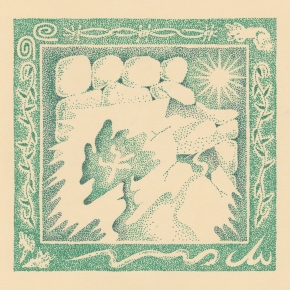
Written by Rosie Long-Decter
“Is this heaven / or its twin?” Mischa Dempsey asks on the opening track to Some Kind of Heaven, the debut full-length by Knitting, out on Mint Records. The unsettling question sets the tone for a dense record that expertly renders anxieties about growing pains and strained relationships. Through precise lyricism, brash guitar solos and whispered vocals, Knitting brings to life Dempsey’s experiences as a 20-something transitioning and working to understand themself in Montreal. At once massive and intimate, Some Kind of Heaven is a rock record that you can blast with your friends or listen to alone in your room, when you’re feeling alienated from everything you know — and wondering if anyone else is, too.
Though Heaven is Knitting’s first LP, Dempsey is no novice. They’ve been playing music professionally since they founded the trio Lonely Parade as a teenager in Peterborough, ON, going on to tour North America and releasing two records before they hit 21. Dempsey started Knitting as a solo project, releasing an EP in 2021, before assembling a band of ringers: Sarah Harris (Property, Amery) on guitar, Piper Curtis (Sunforger) on bass, and Andy Mulcair (Power Buddies, Marlaena Moore) on drums. Though they’ve only been playing together since 2022, Knitting sounds like they’ve been ripping since about 1991. The band has built up a reputation for their sharp, energizing live set, with performances at Treefort Fest, Sled Island, Santa Teresa, New Colossus and more.
In 2023, Knitting went into the studio with Scott Munro (Preoccupations) to record new material, written over a period of several years when Dempsey was navigating experiences of transition and coming into their non-binary identity. Inspired by 90s alt-rock acts like Nirvana and Hole, as well as groups putting a new spin on that era like Wednesday, Momma, and DIIV, the band wanted a sound with more depth and intensity than anything they’d done before. With some songs reaching as many as fifteen guitar tracks, they created a heavy record full of fuzzed-out guitar textures, thick bass lines, and sweeping drum fills, all cocooning — but never fully submerging — Dempsey’s whispered vocals.
With evocative storytelling and a dry sense of humour, Dempsey articulates how we’re haunted by what we try to leave behind. “I’ve been scolding myself with my dead name / it’s hanging on with the ring of a catchphrase,” they sing on “Green,” over a guitar so dirty it sounds almost like a whirring machine. “I tried to put it into words / but in my mouth it all just blurred,” they tell us on the chorus, as Harris joins in with a squealing hook. Though the lyrics emphasize self-doubt or the unsayable, the sound here is assertive and uncompromising, like Harris’ guitar and Mulcair’s punchy drums are making noise on behalf of Dempsey’s narrator — letting out whatever the speaker can’t.
Across Heaven’s ten tracks, Dempsey evokes a creeping disconnect between self and space. Jagged melodies and Curtis’ pulsing bass add to the sense of growing unease, like disaster lies just around the corner. “I’m walking on eggshells / like these floors aren’t mine,” Dempsey sings quietly on “Spirit Gum,” before the song erupts into a sonic outburst. These are bangers for the inside of your skull: huge guitars and incisive images made to rattle around. On the chorus of “Sleeper,” Dempsey’s voice comes forward in a classic emo belt, taking charge of their needs and frustrations: “is it too much to ask / this lucidity to last?” It’s a moment of power and clarity, perfect for singing along. But before you know it Dempsey’s voice is gone, replaced by a restrained riff — a swift answer to the question.
“College Rock Song #1” lives up to its title, serving up the kind of alt-rock anthem that could easily get hours of airplay on campus radio. Dempsey describes the kinds of small losses that feel enormous when you’re young, reminders that you won’t be this young forever: summer ending too soon, your favourite band breaking up. “Homesick is a kind of home,” they sing, before a wall of wailing guitars and drums takes over, and Harris enters with an indelible classic rock solo.
The album’s big themes all coalesce on “Family Tree”: the end of childhood, the line between self and other, the way our anxieties live in our bodies and our homes. “Let it settle under your skin / that you’ll never be that small again / that you’re wanting for what no longer exists,” Dempsey sings. The song has a push-and-pull energy, relaxed in the verses, ramped up in the choruses, as the band carefully matches the tensions in Dempsey’s lyrics. It’s a hard-hitting centrepiece in a record that, start to finish, sounds like four friends deeply tuned into each other — friends who know when to listen, to pull back so the lyrics can shine, and when to let the sound tell the rest of the story.